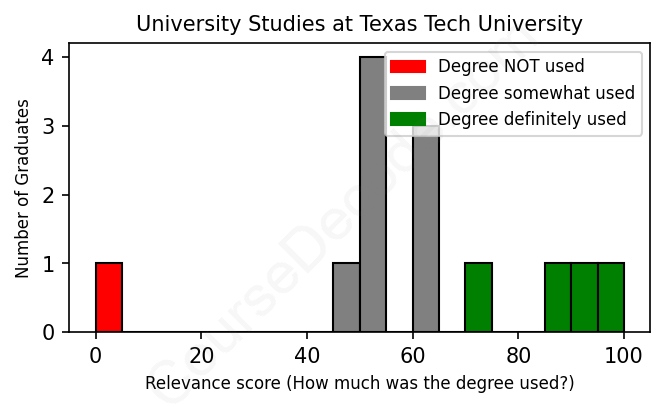
First, some facts. Of the University Studies graduates from Texas Tech University we've analyzed , here's how many have used (or NOT used) their degree in their career:

These are estimates based on AI analysis of 13 LinkedIn profiles (see below).
The verdict? Below average. Overall, with an average relevance score of 59%, University Studies graduates from Texas Tech University have a lower likelihood (-8%) of finding work in this field compared to the average graduate across all fields:
And for comparison, here's the chart for all profiles we've looked at across all degrees.
Also, after graduating, only 30% of these graduates have pursued further education other than another Bachelor's degree (such as a Masters degree or other), compared to the average across all profiles of 35%. This suggests a Bachelors degree is enough for most University Studies graduates, and it's normal to look for work straight after graduation.
See the details:
|
Relevance score: 50% We think this person has gone into a career only somewhat relevant to their degree. We think this person has gone into a career only somewhat relevant to their degree.
DEGREE INFOGraduated in 2022 from Texas Tech University with a Bachelor of Arts - BA in University Studies. No other secondary education since. JOB HISTORY SINCE GRADUATIONHotel Occupancy Tax Collections Specialist City of Fredericksburg Jan 2023 - Present ABOUTNo information provided. |
The top 10 most common jobs done by the graduates we've analyzed (ranked most common to least) are:
The job landscape for graduates with a degree in University Studies from Texas Tech University seems to be quite varied. A significant number of alumni have ventured into coaching roles, particularly in lacrosse, where they leveraged skills like leadership and communication. These positions, such as Assistant Lacrosse Coach or Youth Lacrosse Coach, demonstrate some relatable skills but don't heavily rely on a deep understanding of University Studies. It's kind of like saying you learned teamwork in a class project, but that doesn't mean your project was about that subject specifically.
Aside from coaching, many graduates have taken roles in administration, project management, or creative fields like graphic design. Positions like Manager of Alumni Engagement and Director of Operations incorporate foundational skills from University Studies, but don't necessarily require direct academic connection. In contrast, there are also varying jobs, like engineering and technical roles, for which a University Studies degree might not be as relevant. Overall, while some roles showcase skills learned in University Studies, many graduates seem to be working in positions that may not directly tie back to their degree, focusing more on transferable skills than on specialized knowledge. So, if you're considering a University Studies degree, be prepared that it gives you a versatile skill set, but don't expect every job to specifically connect to what you studied!
Here is a visual representation of the most common words in job titles for University Studies graduates (this is across all University Studies graduates we've analyzed, not just those who went to Texas Tech University):

Graduates from the University Studies program at Texas Tech University seem to have a diverse range of career trajectories, often stepping into roles that relate to education, coaching, and operational management shortly after graduating. For many, the first job after graduation tends to be in teaching, coaching, or administrative positions. For instance, someone who graduated in 2012 started off as an assistant coach and eventually moved into admissions and alumni engagement roles, indicating a shift towards educational administration. Similarly, another graduate jumped straight into a teaching position, showcasing the program's flexibility and applicability to various career paths. This initial phase appears to provide a solid foundation for those interested in educational and organizational roles.
Five to ten years after graduation, many of these individuals have advanced into managerial or specialized roles. For example, graduates have transitioned from entry-level positions like a computer technician or a project coordinator to more significant roles, such as Director of Operations or VP of Business Development. It's clear that the early professional experiences help them build skills that lead to higher responsibilities over time. While some started in more unrelated jobs, they’ve often clustered into careers that align more closely with their degrees as they’ve progressed. Overall, it looks like Texas Tech University graduates from University Studies generally find meaningful careers that leverage their educational backgrounds, although the pathways can be quite varied and sometimes unexpected. The blend of initial roles with future advancements illustrates a positive trend for these graduates in establishing solid, albeit diverse, career paths.
Honestly, a Bachelor’s degree in University Studies can be pretty manageable compared to some other majors, especially if you’re someone who thrives on flexibility and variety. At Texas Tech University, this program is designed to let you explore different subjects and tailor your studies to your interests, which can make things more enjoyable and less tedious. That said, you still have to put in effort and keep up with assignments, but it doesn't usually have the intense workload that more specialized degrees might. So if you’re someone who likes to mix things up and find your own path, you might find it to be a good fit without being overly difficult. Just remember, like with any degree, it's up to you to stay motivated and engaged!
Most commonly, in the LinkedIn profiles we've looked at, it takes people 4 years to finish a Bachelor degree in University Studies.
So looking at these Texas Tech grads, it seems like they've had a bit of a mixed bag when it comes to making decent money. Some of the folks, like the VP of Business Development and Procurement at SitePro Inc., are probably raking in a good salary, especially since they climbed the ranks pretty quickly. Others, like the lacrosse coaches or the admission officer, likely aren't making a ton, though. Teaching and coaching roles tend to be on the lower end of the pay scale, too. Meanwhile, those in tech roles, especially in computer tech and project coordinating positions, might be doing alright financially but it really varies depending on experience and industry. Overall, some are set up for a solid income, while others—well, let’s just say they might not be rolling in cash just yet.
Here is a visual representation of the most common words seen in the "about" section of LinkedIn profiles who have a Bachelor degree in University Studies (this is across all University Studies graduates we've analyzed, not just those who went to Texas Tech University). This may or may not be useful:

Here are all colleges offering a Bachelor degree in University Studies (ordered by the average relevance score of their University Studies graduates, best to worst) where we have analyzed at least 10 of their graduates:
| College | Score | Count |
|---|---|---|
 Texas Tech University Texas Tech University
|
59 | 13 |
 The University of Texas at Arlington The University of Texas at Arlington
|
57 | 10 |